The ability to take control is often referred to as “self-control” or “self-regulation.” It is the capacity to manage and govern one’s thoughts, emotions, behaviors, and impulses in a purposeful and intentional manner. Self-control involves making conscious choices and decisions that align with one’s goals, values, and long-term well-being, even in the face of temptations, distractions, or difficult circumstances.
Key aspects of the ability to take control, or self-control, include…
- Delayed Gratification – The ability to resist immediate rewards or impulses in favor of achieving long-term goals and benefits.
- Emotional Regulation – Managing and controlling emotional reactions to various situations, maintaining composure, and preventing impulsive responses.
- Impulse Control – Refraining from impulsive actions or decisions and instead considering the consequences and alternatives.
- Decision-Making – Making rational and well-informed decisions, even when faced with complex or emotionally charged choices.
- Willpower – Exercising the mental strength and determination to overcome challenges, habits, or temptations that may hinder progress.
- Goal Setting and Pursuit – Setting clear goals and taking consistent actions to achieve them, while resisting distractions or deviations from the plan.
- Resilience – Bouncing back from setbacks, adversity, or failures and continuing to work toward desired outcomes.
- Time Management – Effectively managing time, priorities, and tasks to maximize productivity and achieve goals.
- Self-Discipline – Maintaining consistency in behavior, habits, and routines that support personal growth and success.
- Self-Motivation – Cultivating intrinsic motivation to pursue objectives and maintain commitment, even when external incentives are lacking.
Developing and strengthening self-control is a valuable skill that can lead to better decision-making, increased productivity, improved emotional well-being, and greater success in various areas of life. It often involves self-awareness, self-reflection, and ongoing practice to enhance one’s ability to take control and make choices that align with their best interests.





